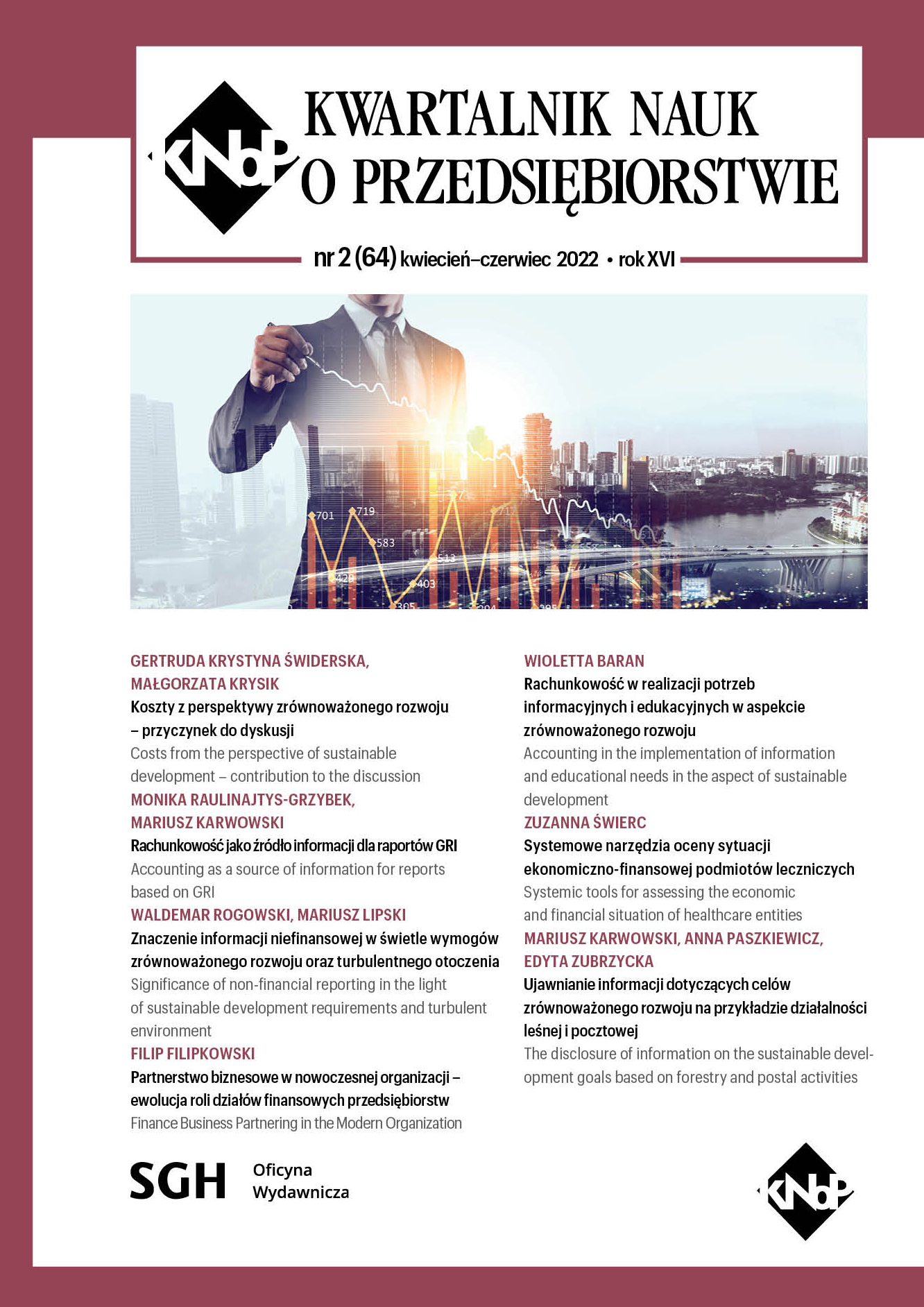Finance Business Partnering in the Modern Organization
Main Article Content
Abstract
Unprecedented changes in the economic environment in last 25 years resulted in tremendous business and organizational challenges, which enterprises had to face. Companies have had to use and their resources in the most efficient way to increase their value and live up to market’s and shareholders’ expectations. One of important resources are finance departments, which have been subject to spectacular changes in this period. Expectations of both internal and external stakeholders induced a serious metamorphosis of senior finance roles from balance sheet and procedures guards to strategic business partners actively participating in decision making process and opening new opportunities for the organization. At the same time, finance departments’ structures has been completely refurbished to free up time spent for value adding activities. The aim of the article is to indicate changes which finance departments have been subject to in recent years as well as look into competencies required to succeed in the new business reality. Special focus is put into the concept of the business partnering being a key success factor in the enterprise finance roles. Author describes also a few examples of further potential changes, which in coming years will impact finance departments’ activities and should drive the acquisition of new competencies by finance specialists.
Downloads
Article Details
The author of the article declares that the submitted article does not infringe the copyrights of third parties. The author agrees to subject the article to the review procedure and to make editorial changes. The author transfers, free of charge, to SGH Publishing House the author's economic rights to the work in the fields of exploitation listed in the Article 50 of the Act of 4 February 1994 on Copyright and Related Rights – provided that the work has been accepted for publication and published.
SGH Publishing House holds economic copyrights to all content of the journal. Placing the text of the article in a repository, on the author's home page or on any other page is allowed as long as it does not involve obtaining economic benefits, and the text will be provided with source information (including the title, year, number and internet address of the journal).
References
Deloitte (2012), Changing the focus. Finance Business Partnering, online: https://www2.deloitte.com/content/dam/Deloitte/uk/Documents/finance-transformation/deloitte-uk-finance-business-partnering.pdf (dostęp: 20.03.2022).
Deloitte (2018), Crunch Time V. Finance 2025, online: https://www2.deloitte.com/content/dam/Deloitte/global/Documents/Finance/gx-ft-crunch-time-V-finance-2025.pdf (dostęp: 16.03.2022).
Little A. D. (2019), Beyond cost efficiencies in shared service centers, online: https://www.adlittle.com/en/beyond-cost-efficiencies-shared-service-centers (dostęp: 16.03.2022).
Krzepkowska M. (2008), Controlling jako narzędzie zarządzania przedsiębiorstwem handlowym w warunkach globalizacji gospodarki, Akademia Ekonomiczna w Poznaniu, Poznań.
Kowalewski M. (2014), Analiza zmian we współczesnym podejściu do budżetowania działalności przedsiębiorstwa, Prace Naukowe Uniwersytetu Ekonomicznego we Wrocławiu, Wrocław, s. 152–161.
Szychta A. (2012), Rachunek kosztów i rachunkowość zarządcza. Zarys rozwoju rachunkowości zarządczej w zachodnich krajach Europy kontynentalnej, w: Współczesne nurty badawcze w rachunkowości, red. I. Sobańska, P. Kabalski, Wydawnictwo Uniwersytetu Łódzkiego, Łódź,.
Świderska G. K. (2017) (red.), Controlling kosztów i rachunkowość zarządcza, Difin/MAC Consulting, Warszawa, s. 452–462, s. 523–527.
PWC (2017), Finance as business partner. Adding up or adding value, online: https://www.pwc.nl/nl/assets/documents/pwc-finance-as-business-partner-adding-up-or-adding-value-2017.pdf (dostęp: 16.03.2022).
PWC (2012), Putting your business on the front foot; online: https://www.pwc.com.uy/en/publicaciones/assets/putting-your-business-on-the-front-foot.pdf (dostęp: 25.03.2022).

